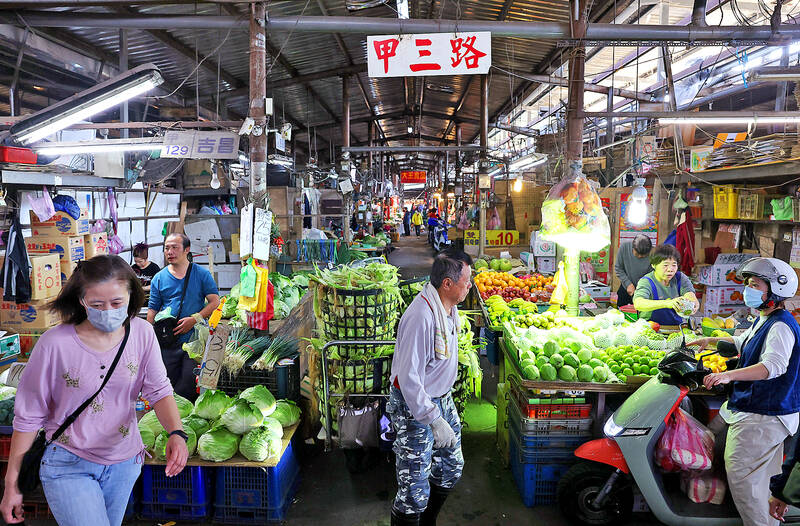Taiwanese this month shed confidence about the nation’s economic outlook, but expressed greater willingness to invest in stocks as financial markets at home and abroad rally to record highs amid a boom in artificial intelligence (AI), a Cathay Financial Holding Co (國泰金控) survey showed yesterday.
Thirty-eight percent of respondents believed the economy would improve in the next six months, 28.6 percent said it would deteriorate and 19.4 percent expected it to hold steady, the survey found.
Sentiment was weaker compared with a month earlier, as GDP growth is expected to be 2.6 percent this year, lower than a government forecast in November last year of 3.35 percent.

Photo: CNA
The Directorate-General of Budget, Accounting and Statistics (DGBAS) is to renew its GDP projection next week.
The sentiment decline likely has to do with expectations by 55 percent of respondents that the consumer price index would climb above 2 percent this year, although the DGBAS has predicted it would slow to 1.64 percent, the survey showed.
The government has indicated plans to increase electricity rates across the board next month to reflect rising fuel prices and to mitigate losses by Taiwan Power Co (台電).
Electricity price increases would boost inflation.
The survey showed that 28.6 percent expect job hunting to become more difficult, while 22.4 percent said it would become easier.
Respondents were positive about the local exchange, with 42.7 percent expecting the TAIEX to rally in the next six months, while 22.8 percent expected a downturn and 20.6 percent had a neutral view, it said.
The TAIEX has benefited from global fund inflows seeking to take advantage of a recovery in technology products.
Leading tech firms released strong earnings results for last quarter and are upbeat about business prospects, citing fast-growing AI applications.
Taiwan is home to the world’s major suppliers of AI severs, high-performance computing chips and graphics cards.
The survey showed that 35.3 percent of respondents expect to increase their holdings of local shares, while 14.2 percent would cut positions and 50.5 percent would maintain their current level of investment.
Regarding large-item purchases, 34.5 percent would increase their budget for such items while 20.7 percent would tighten on such consumption, the survey showed.
Thirty-point-six percent intend to travel overseas more than usual this year, 11 percent aim to cut the frequency and 23.8 percent would keep their travel rates unchanged, it showed.
The results indicate that Taiwan faces a tourism deficit, with domestic hospitality providers facing pressure unless tourism arrivals increase.
Many respondents called on president-elect William Lai (賴清德) to give top priority to lowering home prices, improving wages and stabilizing consumer prices.

UNCERTAINTY: Innolux activated a stringent supply chain management mechanism, as it did during the COVID-19 pandemic, to ensure optimal inventory levels for customers Flat-panel display makers AUO Corp (友達) and Innolux Corp (群創) yesterday said that about 12 to 20 percent of their display business is at risk of potential US tariffs and that they would relocate production or shipment destinations to mitigate the levies’ effects. US tariffs would have a direct impact of US$200 million on AUO’s revenue, company chairman Paul Peng (彭雙浪) told reporters on the sidelines of the Touch Taiwan trade show in Taipei yesterday. That would make up about 12 percent of the company’s overall revenue. To cope with the tariff uncertainty, AUO plans to allocate its production to manufacturing facilities in

Taiwan will prioritize the development of silicon photonics by taking advantage of its strength in the semiconductor industry to build another shield to protect the local economy, National Development Council (NDC) Minister Paul Liu (劉鏡清) said yesterday. Speaking at a meeting of the legislature’s Economics Committee, Liu said Taiwan already has the artificial intelligence (AI) industry as a shield, after the semiconductor industry, to safeguard the country, and is looking at new unique fields to build more economic shields. While Taiwan will further strengthen its existing shields, over the longer term, the country is determined to focus on such potential segments as

COLLABORATION: Given Taiwan’s key position in global supply chains, the US firm is discussing strategies with local partners and clients to deal with global uncertainties Advanced Micro Devices Inc (AMD) yesterday said it is meeting with local ecosystem partners, including Taiwan Semiconductor Manufacturing Co (TSMC, 台積電), to discuss strategies, including long-term manufacturing, to navigate uncertainties such as US tariffs, as Taiwan occupies an important position in global supply chains. AMD chief executive officer Lisa Su (蘇姿丰) told reporters that Taiwan is an important part of the chip designer’s ecosystem and she is discussing with partners and customers in Taiwan to forge strong collaborations on different areas during this critical period. AMD has just become the first artificial-intelligence (AI) server chip customer of TSMC to utilize its advanced

While China’s leaders use their economic and political might to fight US President Donald Trump’s trade war “to the end,” its army of social media soldiers are embarking on a more humorous campaign online. Trump’s tariff blitz has seen Washington and Beijing impose eye-watering duties on imports from the other, fanning a standoff between the economic superpowers that has sparked global recession fears and sent markets into a tailspin. Trump says his policy is a response to years of being “ripped off” by other countries and aims to bring manufacturing to the US, forcing companies to employ US workers. However, China’s online warriors